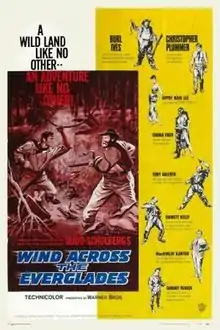Wind Across the Everglades
Wind Across the Everglades is a 1958 film directed by Nicholas Ray. Ray was fired from the film before production was finished, and several scenes were completed by screenwriter Budd Schulberg, who also supervised the editing. Chris Fujiwara wrote on Turner Classic Movies that the film is "an acid test for auteurists, one of those special films that, while ignored or despised for the most part, are cherished and fiercely defended by those who love great American directors."[1]
| Wind Across the Everglades | |
|---|---|
 | |
| Directed by | Nicholas Ray |
| Produced by | Stuart Schulberg |
| Written by | Budd Schulberg |
| Starring | Burl Ives Christopher Plummer Gypsy Rose Lee Chana Eden Mackinlay Kantor Emmett Kelly |
| Music by | Paul Sawtell Bert Shefter |
| Cinematography | Joseph C. Brun |
| Edited by | Georges Klotz Joseph Zigman |
| Distributed by | Warner Bros. |
Release date |
|
Running time | 93 minutes |
| Country | United States |
| Language | English |
_and_Nicholas_Ray_during_the_filming_of_%22Wind_Across_the_Everglades%22.jpg.webp)

The film stars Burl Ives, features Christopher Plummer in his first lead role (and his second film role overall) and introduces Chana Eden, who plays the leading lady, and Peter Falk, who plays a minor role. Former stripper Gypsy Rose Lee and circus clown Emmett Kelly also are among those in an unusual cast.[2]
It was filmed on location in Everglades National Park in Technicolor.
Plot
Set in the early 20th century, the film follows a game warden (Christopher Plummer) who arrives in Florida in the hopes of enforcing conservation laws. He soon finds himself pitted against Cottonmouth (Burl Ives), the leader of a fierce group of bird poachers. The film was loosely based upon the life and death of Guy Bradley, an early game warden who in 1905 was shot and killed by plume hunters in the Everglades.[3]
Cast
- Burl Ives as Cottonmouth
- Christopher Plummer as Walt Murdock
- Gypsy Rose Lee as Mrs. Bradford
- George Voskovec as Aaron Nathanson
- Tony Galento as Beef
- Howard I. Smith as George Liggett
- Emmett Kelly as Bigamy Bob
- Pat Henning as Sawdust
- Chana Eden as Naomi Nathanson
- Curt Conway as Perfessor
- Peter Falk as Writer
- Fred Grossinger as Slowboy
- Sammy Renick as Loser
- Toch Brown as One-note
- Frank Rothe as Howard Ross Morgan
- MacKinlay Kantor as Judge Harris
- Cory Osceola as Billy One-Arm
Critical reputation
Due to Ray's having been fired from the production before the film was completed, Wind Across the Everglades holds a contentious place in film scholarship. In a short review of the film, critic Jonathan Rosenbaum described it as "a kind of litmus test for auteurists".[4] After citing the film's editorial history, Rosenbaum goes on to say that "Ray's masterful use of color and mystical sense of equality between the antagonists (also evident in Rebel Without a Cause and Bitter Victory) are made all the more piquant here by his feeling for folklore and outlaw ethics as well as his cadenced mise en scene."[4] While it was praised for its ahead-of-its-time ecological themes[5] and authentic and unusual scenery, the film still suffered from "editorial hacking and post-production cheapness" leading to an overall effect of "one of those production disasters that bleeds brilliance in all directions."[2]
See also
References
- Fujiwara, Chris. "Wind Across the Everglades". Nicholas Ray's 100th Birthday. Turner Classic Movies. Retrieved 23 January 2018.
- Erickson, Glenn. "Wind Across the Everglades". Trailers From Hell. Retrieved 23 January 2018.
- Wilbanks, William. Forgotten Heroes: Police Officers Killed in Early Florida, 1840–1925. Paducah, KY: Turner Pub. Co., 1998. pg. 83.
- Chicago Reader: Wind Across the Everglades
- Barrett, Michael. "'Wind Across the Everglades' Blows Hot and Cold". pop matters. Retrieved 23 January 2018.